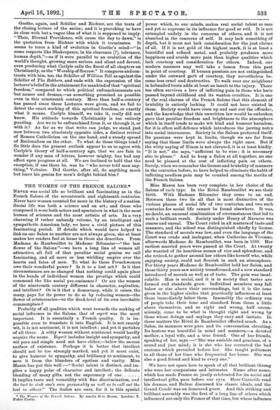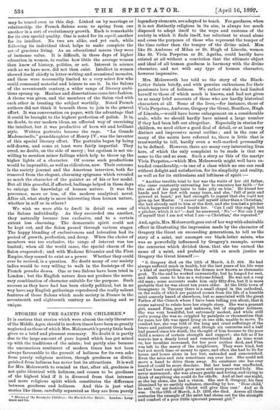THE WOMEN OF THE FRENCH SALONS.*
NEVER was social life so brilliant and fascinating as in the French Salons of the seventeenth and eighteenth centuries. Never have women counted for more in the history of a nation. Social life was both a science and an art ; and those who composed it were both actors and spectators in what is the most human of sciences and the most artistic of arts. In a very charming if rather unhandy volume, by an intelligent and sympathetic, American lady, we have a vivid picture of this -fascinating period. If details which would have helped to link on one Salon to another are not always given, she at least makes her readers feel at home in those she describes. From Madame de Rambouillet to Madame Recamier—" the last flower of the Salons "—we have a long line of women all attractive, all fall of that peculiar social genius we call fascinating, and all more or less wielding empire over the hearts and fates of men. To what do these Frenchwomen owe their wonderful power ? Is it to a lost art ? Is it that circumstances are so changed that nothing could again place in the hands of individual women the prestige which could command the like social pre-eminence ? Or are the women of the nineteenth century different in character, aspiration, and intellect ? Or is it that a democracy, while it raises the many, pays for its power to do so by reducing women—the flower of aristocracies—to the dead-level of its own inevitable commonplace ?
Probably of all qualities which went towards the making of social influence in the Salons, that of esprit was the most important. It is essentially a French quality. It is im- possible even to translate it into English. It is not exactly wit, it is not sentiment, it is not intellect ; and yet it partakes of all three. A witty woman without sentiment would hardly acquire the name. Esprit includes insight and sympathy, and wit pure and simple need not have either,—below the merest surface of existence. Perhaps it is better that intellect should not be too strongly marked, and yet it must exist, to give humour to sympathy, and brilliancy to sentiment, to save it from the blunders of egotism and vanity. Miss Wagon has put this well :—" Social talent is distinct, and im- plies a happy poise of character and intellect ; the delicate blending of many gifts, not the supremacy of one It implies taste and versatility with fine discrimination, and the tact to sink one's own personality as well as to call out the best in others." The italics are ours, for it is this special
• The Women of the French &acme. By Amelia (kre Mason. London T. Maher Union.
power which, to our minds, makes real social talent so rare and yet so supreme in its influence for good or evil. It is not entangled unduly in the concerns of others, and it is not absorbed in the concerns of self. It may lack something of depth, but it must not lack consideration for the just claims of all. If it is not gold of the highest mark, it is at least a beautiful and refined metal, and probably produces more happiness and avoids more pain than higher qualities which lack courtesy and consideration for others. Indeed, our modern manners may well take a lesson from this past in point of courtesy. If human passions are not extinguished under the outward garb of courtesy, they nevertheless be- come less cruel and destructive. To walk over our neighbour in hobnailed boots adds at least an insult to the injury. There too often survives a love of inflicting pain in those who have passed beyond childhood and its wanton cruelties. It is one of the real charms of the French Salons that this element of brutality is entirely lacking. It could not have existed in them. Society would have risen up and cast out the offender, and the knowledge that this unwritten law would be unbroken gave that peculiar freedom and brightness to the atmosphere which in itself tends to make wit kind and humour harmless, for it is often self-defence which introduces the jarring notes into social intercourse. Society in the Salons protected itself.
Its passions were kept in limits, though we are far from saying that those limits were always the right ones. But if the witty saying of Ninon is not elevated, it is at least kindly.
"It is not," she says, "sufficient to be wise ; it is necessary also to please." And to keep a Salon at all together, no one need be pleased at the cost of inflicting pain on others. Surely, when we remember the license and brutality of manners in the centuries before, to have helped to eliminate the habit of inflicting needless pain may be counted among the merits of the French Salons.
Miss Mason has been very complete in her choice of the Salons of each type. In the Hotel Rambouillet we see their birth. With Madame Recamier they come to an end. Between these two lie all that is most distinctive of the various phases of social life of two centuries, and two such centuries for social life cannot be found elsewhere. It was, no doubt, an unusual combination of circumstances that led to such a brilliant result. Society under Henry of Navarre was coarse and unreal The Court ruled in all matters of taste and manners, and the school was distinguished chiefly by license. The standard of morals was low, and even the language of the Court was crude and inelegant, when Catherine de Vivonne, afterwards Madame de Rambouillet, was born in 1588. Her earliest married years were passed at the Court. At twenty she wearied of its heartless scenes of vice and splendour, and she retired, to gather around her others like herself who, while enjoying society, could not flourish in such an atmosphere.
For thirty years Madame de Rambouillet held her Salon, and those thirty years saw society transformed, and a new standard introduced of morals as well as of taste. The gain was incal- culable. Man is social, and it is in society that tastes are formed and standards grow. Individual members may fall below or rise above their surroundings, but it is the tone given in the higher circles that practically influences at least those immediately below them. Insensibly the ordinary run of people take their tone and standard from those a little above themselves, and so right and wrong, half uncon- sciously, come to be what is thought right and wrong by those whose doings and sayings they envy and imitate. In these matters the Hotel de Rambouillet effected much. As a Salon, its manners were pure and its conversation elevating. Its hostess was beautiful in mind and manners,—a devoted mother, a loyal wife, and a true friend. One of her friends, speaking of her, says :—" She was amiable and gracious, of a sound and just mind; it is she who has corrected the bad customs which prevailed before her. She taught politeness to all those of her time who frequented her house. She was also a good friend and kind to every one."
We have not space here to speak of all that brilliant throng who were her companions and intimates. Name after name, which has made France so justly celebrated for its social and intellectual gifts, pass before our eyes. Here Corneille read his dramas, and Balzae discussed his classic ideals, and the Grand Conde was an honoured guest. And this striking and brilliant assembly was the first of a long line of others which influenced not only the France of that time, but whose influence
may be traced even to this day. Linked on by marriage or relationship, the French Salons seem to spring from one another in a sort of evolutionary growth. Each is remarkable for its own special quality. One is noted for its esprit, another for its intellect. No two are alike, and yet each, while following its individual ideal, helps to make complete the art of gracious living. As an educational means they were of immense value. It is difficult, in these days of higher education in women, to realise how little the average woman then knew of history, politics, or art. Interest in science such as we have now, did not then exist. Intellect in women showed itself chiefly in letter-writing and occasional memoirs, and these were necessarily limited to a very select few who could command material and leisure to use it. In the Salons of the seventeenth century, a wider range of literary ambi- tions sprang up. Maxims and dissertations came into fashion. A theme was given, and the members of the Salon vied with each other in treating the subject worthily. Noted French authors did not think it beneath them to join in the general effort. It was conversation on paper, with the advantage that it could be brought to the highest perfection of polish. It is, no doubt, to our modern ideas, an affected way of exercising the intellect, but it was productive of keen wit and brilliant style. Written portraits became the rage. "La Grande Mademoiselle," granddaughter of Henry IV., was the inventor of this special literary effort. The portraits began by being self-drawn, and some at least were fairly impartial. They erred, no doubt, on the aide of mercy ; but egotism is not un- willing to mention minor failings which help to throw up the higher lights of a character. Of course such productions would be impossible, as well as ridiculous, now. Their outcome is the society journal and the American interview, both far removed from the elegant, charming epigrams which revealed as much the character of the painter as of his or her model. But all this graceful, if affected, badinage helped in those days to enlarge the knowledge of human nature. It was the precursor, more or less, of the modern analytical novel. After all, what study is more interesting than human nature, whether in self or in others P We wish we were able to dwell in detail on some of the Salons individually. As they succeeded one another, they naturally became less exclusive, and to a certain extent less charming. The democratic spirit could not be kept out, and the Salon passed through various stages. The happy blending of exclusiveness and toleration had its period of growth, perfection, and decay. When the choice of members was too exclusive, the range of interest was too limited ; when all the world came, the special charm of the Salon evaporated ; and with Madame Recamier and the First Empire, they ceased to exist as a power. Whether they could ever be revived, is a question. No doubt many of our society ladies would be very willing to walk in the footsteps of the French grandes dames. One or two Salons have been tried in London ; but the English nature does not produce the neces- sary combination of character suitable for the purpose. Such success as they have had has been chiefly political, but in no way have any English gatherings reproduced the really salient features of those Salons which made society in France in the seventeenth and eighteenth century so fascinating and so unique.

































 Previous page
Previous page